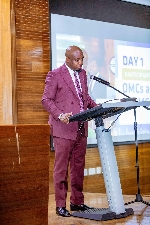Benjamin Nsiah advocates better working conditions, emoluments for tanker drivers
 Energy analyst and Chief Executive Officer of the Center for Environmental Management and Sustainable Energy (CEMSE), Benjamin Nsiah
Energy analyst and Chief Executive Officer of the Center for Environmental Management and Sustainable Energy (CEMSE), Benjamin Nsiah
Energy analyst and Chief Executive Officer of the Center for Environmental Management and Sustainable Energy (CEMSE), Benjamin Nsiah, has called on the government of Ghana, the National Petroleum Authority (NPA), and all stakeholders in the downstream petroleum sector to critically consider and improve the welfare of tanker drivers.
Sharing the centre’s findings via the Industry Employee Welfare Survey Among Tanker Drivers with Class Business’s Christoher Atitso on Class 91.3 FM’s 5o5, Benjamin Nsiah likened the work of tanker drivers to slavery. He said it does not benchmark the International Labour Organisation threshold of labour law.
“We are in an era of sustainable leadership and development, hence it’s important to consider the wellbeing of the people who work, the environment and the profit to be made. However, the NPA is only concerned about the profit of businesses and not the welfare of tanker drivers,” Nsiah worried.
Highlighting the critical role tanker drivers play in the growth of the downstream petroleum sector and in the social economic development of the country, Nsiah noted some tanker owners were not adhering to the 2017 emoluments framework aimed at enhancing the working conditions of tankers drivers thereby affecting the welfare of employees who are major transporters of assorted essential petroleum products to various Oil Marketing Companies (OMCs) across the country.
The CEMSE’s Industry Employee Welfare Survey Among Tanker Drivers underlined drivers were not given risk allowances nor compensations when involved in an accident. It also noted other challenges the absence of salary increment since 2017, non-payment of Social Security & National Insurance Trust (SNNIT) contributions, the lack of retirement packages for health issues as well as bad roads affecting productivity and bad nature or non-hygienic infrastructure at the various depots.
CEMSE observed and proposed the aging workforce in the sector called for the adoption of a framework that can attract younger employees into the field for the sustainability of the sector.
It added a medical compliance framework must be formulated, implemented and enforced to promote healthy practices among drivers, as well as provision of better education regarding driver’s SSNIT contributions.
CEMSE’s Industry Employee Welfare Survey Among Tanker Drivers also charged the NPA to develop a mechanism to track payments of the right emoluments and other benefits to workers in the downstream petroleum sector.
Trending Business

Lady Mae injects GHS 1.59m into women's empowerment as she launches 'Save You First'
15:34
International livestock market launched in Volivo to boost trade and create 500 jobs
17:09
NPA CEO says $200m needed to fully revamp TOR and expand capacity
12:35
TOR resumes crude oil refining after years of inactivity
10:32
Gov't to revive Juapong Textiles through PPP-Ablakwa reveals
10:12
TAGG raises alarm over GRA–TRUEDARE digital customs deal
14:15
Government, Afreximbank resolve issues over US$750m facility
10:17
Muntaka Entrepreneurship Hub trains over 100 women in Asawase
14:16
Ghana Gold Board rakes in over $10bn ahead of target
09:56
GEXIM faces GHS1.5bn credit exposure as NPLs near 30% — CEO
09:36



